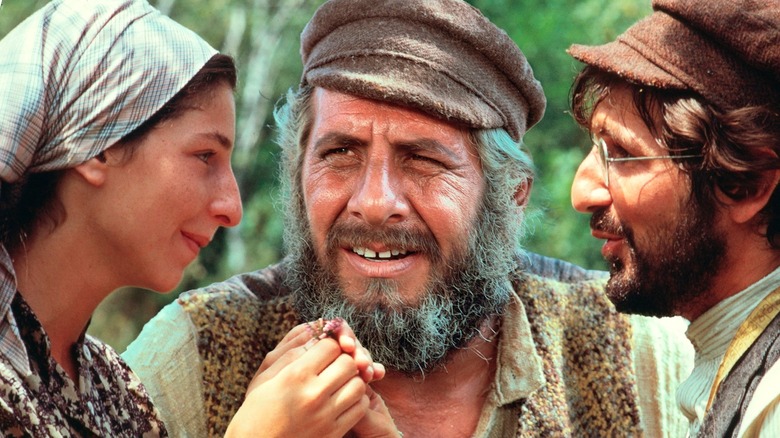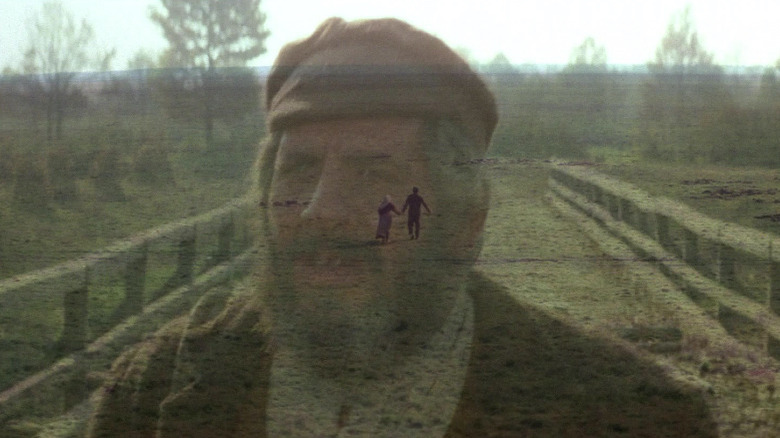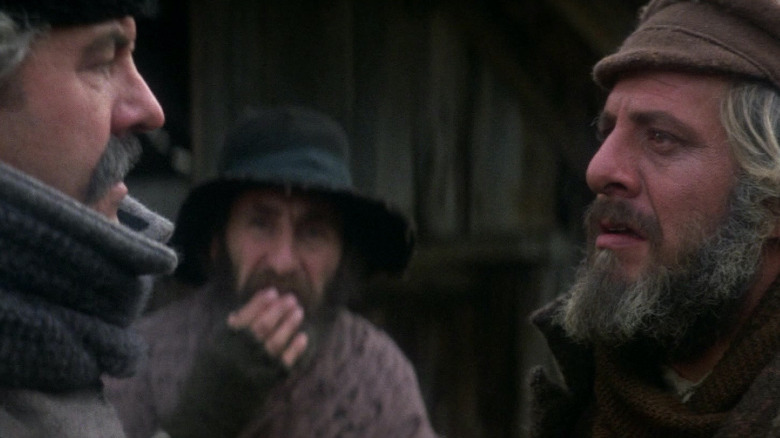Over 50 Years Later, Fiddler On The Roof And Topol's Performance Are More Relevant Than Ever
Growing up, my parents never shielded me from the horrors of antisemitism. I suspect a lot of it was my dad's doing. He would often tell us about his childhood in New Jersey, where many of his fellow students (including his first girlfriend) were Jewish and a number of his teachers were actual Holocaust survivors (as you could tell from the numbers tattooed on their forearms). As such, my siblings and I wound up seeing "Schindler's List" pretty much as soon as it became available on VHS. Mind you, as young as we all were at the time, my parents didn't throw us in the deep end of the pool right away. We had seen the "Indiana Jones" movies many times by then and watched films like "An American Tail," so the concept of antisemitism had, in ways obviously more accessible to kids, already been drilled into our heads.
I didn't see "Fiddler on the Roof" until I was in middle-school. Much as I pretended I wasn't really into musicals back then ('cause of toxic masculinity, basically), the film left a strong impression on me. Chaim Topol's turn as poor Jewish milkman Tevye is just so full of spit and vinegar it's darn near-impossible not to be charmed by him, whether he's singing his guts out to a barn of undoubtedly confused farm animals during the iconic "If I Were a Rich Man" musical number or being irritated, if not downright flabbergasted, by his strong-willed daughters' determination to lead a life of their own choosing. Youths these days, amirite, Tevye?
When I revisited the movie for its 50-year anniversary, I was pleased by how well it held up. But what really stuck out was just how relevant and powerful the late Topol's performance and Norman Jewison's 1971 film itself remain.
To life
I've no pretensions of being a scholar in the arena of Jewish history and culture, so I'll leave it to others to discuss the authenticity of "Fiddler on the Roof" and its source material (the 1964 stage musical of the same name, itself based on Sholem Aleichem's short story collection, "Tevye and his Daughters"). In Norman Jewison's film, however, life in the early 20th-century Ukrainian village of Anatevka — a small town with a predominantly Ashkenazi Jewish population — is certainly relatable for anyone who belongs to a marginalized community in the present-day. There's the constant, threatening presence of the Tsar's police officers and the locals' growing anxiety that it's only a matter of time before they, too, join the ranks of Jewish villagers ordered to leave their homes. Yet, life must go on for Tevye and his family, whose days are filled with joy, love, and woe, just like anyone else's.
Jewison's Best Director Oscar nod for "Fiddler" was well-earned. He and his director of photography, Oswald Morris, fill the movie with gorgeous compositions that range from bucolic landscapes to intimate close-ups that capture every minor detail on the actors' faces, resulting in a film that's as much a personal character study as it is a flashy musical. It's also very much the latter, with its amazing songs and dances filmed in wide angles that allow you to appreciate the cast's every move and gesture, yet dynamically edited together through smash cuts and dissolves so as to avoid feeling like a glorified filmed Broadway show. But with so much of the film's story regaled from Tevye's point of view and through his internal conversations with God (a clever adaptation of the character's asides to the audience on the stage), it really lives and dies on Topol's performance.
Sunrise, sunset
Throughout "Fiddler on the Roof," Tevye is forced to keep up with an ever-changing world that keeps pulling the rug out from under him. If his daughters aren't defying tradition by choosing their own husbands, they're falling in love with Marxist radicals — putting them, very literally, in the line of fire — or, even worse, a young Russian Orthodox Christian. Then there are the Tsarist troops' unprovoked attacks on Anatevka and the knowledge things will likely only get worse, all of which Tevye must deal with as he works, day in and day out. In Topol's caring hands, Tevye is sympathetic and deeply relatable; you appreciate his willingness to adapt his way of thinking to the times, yet understand when he reaches the breaking point where, as he puts it, "there is no other hand" to consider.
In a time when antisemitism is on the rise, anti-LGBTQ+ bills are being filed across the U.S. (most of them targeting trans people), and police violence against Black individuals and other people of color rages on, "Fiddler" reminds us the struggle to keep our heads above the water while the planet ceaselessly spins into the future is nothing new. It doesn't offer any easy answers to this dilemma, either; there's almost no music during the last half-hour of the three-hour film, allowing us to deeply feel the burdens on Tevye and his community without the catharsis of a lively song-and-dance number. Like the humble milkman, the best we can do is muster all the empathy we possess, try to help those less privileged than ourselves, and trudge on, knowing we will always carry the lessons we learned when we were younger with us.
Like a fiddler on the roof, trotting after us to our next destination (wherever that might be).


